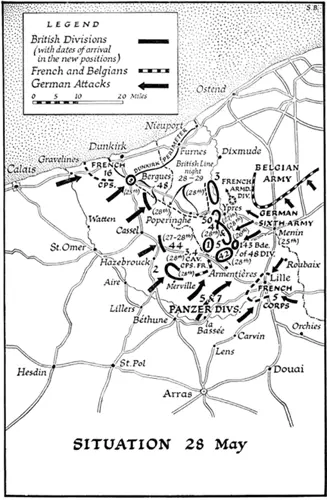It was therefore idle to try – the chance wasn’t worth the effort involved; he agreed with Prioux.
He then asked, in terms, whether it was therefore Gort’s intention to withdraw tonight to the line Ypres-Poperinghe-Cassel or not, knowing that in doing so Gort would be going without the French First Army. To which Gort replied that he was going. In the first place, he had been ordered to re-embark, and to do so necessitated immediate withdrawal. To wait another twenty-four hours would mean that he would not be able to carry out his orders, for the troops would be cut off. In the second place, and apart from the formal aspect of obeying orders, it was madness to leave the troops forward in their present exposed positions. There, they would certainly be overwhelmed very soon. For these reasons, therefore, and with great regret, it was necessary for the B.E.F. to withdraw even if the First French Army did not do so….

* * * * *
In the early hours of the 28th, the Belgian Army surrendered. Lord Gort had intimation of this only one hour before the event, but the collapse had been foreseen three days earlier, and in one fashion or another the gap was plugged. I announced this event to the House in far more moderate terms than those M. Reynaud had thought it right to use:
The House will be aware that the King of the Belgians yesterday sent a plenipotentiary to the German Command asking for a suspension of arms on the Belgian front. The British and French Governments instructed their generals immediately to dissociate themselves from this procedure and to persevere in the operations in which they are now engaged. However, the German Command has agreed to the Belgian proposals and the Belgian Army ceased to resist the enemy’s will at four o’clock this morning.
I have no intention of suggesting to the House that we should attempt at this moment to pass judgment upon the action of the King of the Belgians in his capacity as Commander-in-Chief of the Belgian Army. This army has fought very bravely and has both suffered and inflicted heavy losses. The Belgian Government has dissociated itself from the action of the King, and, declaring itself to be the only legal Government of Belgium, has formally announced its resolve to continue the war at the side of the Allies.
* * * * *
Concern was expressed by the French Government that my reference to King Leopold’s action was in sharp contrast to that of M. Reynaud. I thought it my duty, when speaking in the House on June 4, after a careful examination of the fuller facts then available, and in justice not only to our French Ally, but also to the Belgian Government now in London, to state the truth in plain terms.
At the last moment when Belgium was already invaded, King Leopold called upon us to come to his aid, and even at the last moment we came. He and his brave, efficient Army, nearly half a million strong, guarded our left flank and thus kept open our only line of retreat to the sea. Suddenly, without prior consultation, with the least possible notice, without the advice of his Ministers and upon his own personal act, he sent a plenipotentiary to the German Command, surrendered his Army, and exposed our whole flank and means of retreat.
* * * * *
All this day of the 28th, the escape of the British Army hung in the balance. On the front from Comines to Ypres and thence to the sea, facing east and attempting to fill the Belgian gap, General Brooke and his Second Corps fought a magnificent battle. For two days past, the 5th Division had held Comines against all attacks, but as the Belgians withdrew northward, and then capitulated, the gap widened beyond repair. The protection of the flank of the B.E.F. was now their task. First the 50th Division came in to prolong the line; then the 4th and 3d Divisions, newly withdrawn from east of Lille, hastened in motor transports to extend the wall of the vital corridor that led to Dunkirk. The German thrust between the British and Belgian armies was not to be prevented, but its fatal consequence, an inward turn across the Yser, which would have brought the enemy onto the beaches behind our fighting troops, was foreseen and everywhere forestalled.
The Germans sustained a bloody repulse. Orders were given to the British artillery, both field and medium, to fire off all their ammunition at the enemy, and the tremendous fire did much to quell the German assault. All the time, only about four miles behind Brooke’s struggling front, vast masses of transport and troops poured back into the developing bridgehead of Dunkirk, and were fitted with skilful improvisation into its defences. Moreover, within the perimeter itself, the main east-west road was at one time completely blocked by vehicles, and a one-way track was cleared only by bulldozers hurling them into the ditches on either side.
In the afternoon of the 28th, Gort ordered a general withdrawal to the bridgehead, which now ran Gravelines-Bergues-Furnes-Nieuport. On this front the British divisions stood from right to left, and from Bergues to the sea by Nieuport, in the following order: 46th, 42d, 1st, 50th, 3d, and 4th. By the 29th, a large part of the B.E.F.
1 comment